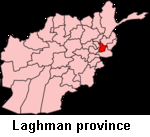More dead civilians, more denials
From Agence France-Presse:
5 Afghans die in US-led strikesThe grim toll for August:
KABUL, Aug 30 (AFP) - Two senior Afghan police officers alleged Saturday that the US-led coalition killed five civilians in airstrikes aimed at Taliban insurgents, but theforce denied causing any civilian casualties...
“Five civilians, including two women and a child, were killed in an airstrike by coalition forces early this morning,” Sayed Sakhidad, criminal investigation police chief for Kapisa province outside Kabul, told AFP.
Five Taliban were also killed, he said. Kapisa’s deputy provincial police chief Abdul Hamid Hakimi also said, “Five civilians and as many rebels, including a militant commander, were killed in the strikes.”
He gave the names of the civilian dead, whom he said were from the same family and included two females and three males, one of them 17 years old.
The coalition dismissed the allegations. “There were no civilian casualties in that incident,” a spokesman said. The coalition said in a statement earlier that “several militants” were killed in the operation in Kapisa’s Nijrab district, which started Friday.
Troops were looking for a Taliban commander involved in smuggling weapons and attacks on foreign soldiers when they came under attack from a compound, the coalition said... (link)
Aug 4: US troops in Ghazni province kill five civilians.
Aug 7: US troops kill five civilians in Ghazni.
Aug 9: NATO airstrike kills between 11 and 31 civilians in Kapisa.
Aug 12: NATO troops kill driver in Helmand.
Aug 13: NATO airstrike kills 3 children in Logar.
Aug 16: Local officials say NATO bombing kills 11 civilians in Ghazni.
Aug 17: NATO rocket attack kills 3 civilians in Helmand.
Aug 19: German NATO troops in Badakhshan province shoot and kill a man later said to have been a civilian.
Aug 21: US-led forces call airstrikes that kill between 12 and 20 civilians in Laghman province. (One report cites locals saying at least 24 civilians were killed.)
Aug 22: US special forces accompanying Afghan troops called in an airstrike in Shindand district of Herat. Estimates by Afghan and UN officials, journalists and the AIHRC range from 78 to 95 civilians dead. Locals say no insurgents were present at the time of the attack.
Aug 27: American-led soldiers kill Afghan national cricket star Rahmat Wali in a raid on his home in Khost.
Aug 28: In Kunduz, German (or Afghan) troops open fire on a vehicle, killing two children and a woman.
Aug 30: In Kapisa, an airstrike in support of US-led forces kills five civilians, according to police officials.
Total: 139 to 184 civilians killed.*
July's toll revisited:
July 3: Six civilians killed in US-led airstrike in Farah.
July 4: Seventeen civilians killed in US airstrike in Nuristan.
July 6: US airstrike in Nangarhar kills 47 to 52 civilians in wedding party - mostly women and children.
July 9: In Logar province, NATO troops kill a civilian man and injure his wife in a house raid.
July 9: Red Cross says 250 civilians dead in five days (i.e. July 4 - 8). The NGO blames both insurgents and NATO/US forces and their Afghan allies.
Jul 15: NATO airstrike kills eight (perhaps nine) civilians - mostly women and children - in Farah.
July 16: Local officials say over 50 civilians killed by NATO airstrikes in Herat.
July 19: NATO forces kill four (perhaps seven) civilians with mortars in Paktika.
July 20: Airstrike kills nine Afghan police in Farah. Other reports say it was four police and five civilians.
July 26: British NATO troops in Helmand shoot and kill four civilians at checkpoint.
July 26: NATO airstrike kills civilian couple in their home in Kapisa.
July 27: Canadian NATO troops in Kandahar fire on a vehicle and kill two children.
July 29: An ISAF helicopter kills six civilians in Kunar province, according to local officials.
Total: 147 to 161 civilians killed.*
* Totals are based on the author's own tallies of all available reports of Afghan civilians killed by troops of NATO's International Security Assistance Force and the US-led Operation Enduring Freedom.
















